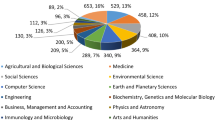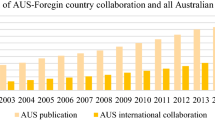Abstract
This paper examines co-authorship of research articles in Thomson Reuters citation indexes in order to assess knowledge co-production in selected sub-Saharan African countries. Two indicators, namely publications and citations, were analysed to establish the patterns of knowledge co-production and its scientific impact, respectively. The study found that knowledge production through collaborative research among sub-Saharan African countries is minimal and contributes only a small percentage when compared to collaboration between sub-Saharan African countries and their foreign counterparts. Similarly, the scientific impact of international collaboration was higher than that of continental collaboration. Countries belonging to the same geographic region contributed to each other’s knowledge production more frequently than they did to the countries outside their region. It is recommended that, for knowledge co-production in sub-Saharan Africa to improve, various measures such as encouraging student and staff exchange, hosting more regional conferences and encouraging research networks need to be put in place.


Similar content being viewed by others
References
Cybermetrics Lab. Consejo Superior de Investigaciones Científicas (CSIC). (2010). Ranking of World universities: Top Africa. Accessed July 28, 2010, from http://www.webometrics.info/top100_continent.asp?cont=africa.
Abramo, G., D’Angelo, C. A., & di Costa, F. (2009). Research collaboration and productivity: Is there correlation? Higher Education, 57, 155–171.
Adams, J., King, C., & Hook, D. (2010). Global research report—Africa. Leeds, UK: Thomson Reuters. Accessed August 01, 2010, from http://researchanalytics.thomsonreuters.com/m/pdfs/globalresearchreport-africa.pdf.
Aeberhard, A., & Rist, S. (2008). Transdisciplinary co-production of knowledge in the development of organic agriculture in Switzerland. Ecological Economics, 68, 1171–1181.
Arocena, R., & Sutz, J. (2001). Changing knowledge production and Latin American universities. Research Policy, 30, 1221–1234.
Arvanitis, R., Waast, R., & Gaillard, J. (2000). Science in Africa: A bibliometric panorama using PASCAL database. Scientometrics, 47(3), 457–473.
Borgatti, S. P., Everett, M. G., & Freeman, L. C. (2002). Ucinet 6 for Windows. Harvard: Analytic Technologies.
Boshoff, N. (2009). South-South research collaboration of countries in the Southern African Development Community (SADC). Scientometrics. doi:10.1007/s1119200901200.
Choung, J.-Y., Min, H.-G., & Park, M.-C. (2003). Patterns of knowledge production: The case of information and telecommunication sector in Korea. Scientometrics, 58(1), 115–128.
Collazo-Reyes, F., Luna-Morales, M. E., Russell, J. M., & Perez-Angon, M. A. (2010). Enriching knowledge production patterns of Mexican physics in particles and fields. Scientometrics. doi:10.1007/s1119201002291.
Egbu, C. (2006). Knowledge production and capabilities—their importance and challenges for construction organizations in China. Journal of Technology Management in China, 1(3), 304–321.
Frenken, K. (2002). The geography of collaborative knowledge production: Entropy techniques and results for the European Union. Paper presented at 42nd European Congress Regional Science Association, Dortmund, Germany, August 27–31, 2002. Accessed July 28, 2010, from http://www-sre.wu-wien.ac.at/ersa/ersaconfs/ersa02/cd-rom/papers/029.pdf.
Gerber, R. E. (2005). The need for a shift in the South African educational research epistemological landscape. South African Journal of Higher Education, 19, 1395–1404.
Gibbons, M., Limoges, H., Schwartzman, S., Scott, P., & Trow, M. (1994). The new production of knowledge: The dynamics of science and research in contemporary societies. London: SAGE Publications.
Godin, B., & Gingras, Y. (2000). The place of universities in the system of knowledge production. Research Policy, 29, 273–278.
Hayashi, T., & Fujigaki, Y. (1999). Differences in knowledge production between disciplines based on analysis of paper styles and citation patterns. Scientometrics, 46(1), 73–86.
Heinze, T., & Kuhlmann, S. (2008). Across institutional boundaries? Research collaboration in German public sector nanoscience. Research Policy, 37, 888–899.
Hessels, L. K., & van Lente, H. (2008). Re-thinking knowledge production: A literature review and a research agenda. Research Policy, 37, 740–760.
Hoekman, J., Frenken, K., & Tijssen, R. J. W. (2010). Research collaboration at a distance: changing spatial patterns of scientific collaboration within Europe. Research Policy. doi:10.1016/j.respol.2010.01.012.
Hoekman, J., Frenken, K., & van Oort, F. (2009). The geography of collaborative knowledge production in Europe. Annals of Regional Science, 43, 721–738.
Huff, A. S. (2000). 1999 Presidential address: Changes in organizational knowledge production. The Academy of Management Review, 25(2), 288–293.
Imeda, S. N. (2005). The idea of a South African university and implications for knowledge production. South African Journal of Higher Education, 19, 1405–1418.
Jacob, M. (2000). ‘Mode 2’ in context: The contract researcher, the university and the knowledge society. In M. Jacob & T. Hellstrom (Eds.), The future of knowledge production in the academy. Buckingham: The Society for Research into Higher Education.
Jansen, D., von Gortz, R., & Heidler, R. (2010). Knowledge production and the structure of collaboration networks in two scientific fields. Scientometrics, 83, 219–241.
Klitkou, A., Patel, P., & Campos, A. (2009). Linkages between technical universities and industry measured by co-authorship and patent data. Accessed March 30, 2010, from http://muteis.infonomics.nl/MEIDE/papers/2009/1235891044_AD.pdf.
Le Grange, L. (2005). Reflexivity and new modes of knowledge production: The case of the human and social sciences. South African Journal of Higher Education, 19, 1444–1455.
Lundberg, J. (2006). Bibliometrics as a research assessment tool—impact beyond the impact factor. Stockholm: Karolinska Institutet. Accessed July 27, 2010, from http://diss.kib.ki.se/2006/91-7140-965-3/thesis.pdf.
Moravec, J. W. (2007). A new paradigm of knowledge production in Minnesota Higher Education: A Delphi study. Ann Arbor, MI: ProQuest Information and Learning Co.
Narvaez-Berthelemot, N., Russell, J. M., Arvanitis, R., Waast, R., & Gaillard, J. (2002). Science in Africa: An overview of mainstream scientific output. Scientometrics, 54(2), 229–241.
Onyancha, O. B. (2009). South Africa’s regional and international collaboration: An informetric study of participating countries, 1986–2005. In D. N. Ocholla & D. Jacobs (Eds.), Proceedings of the DLIS 10th Annual Conference, 2009 (pp. 176–198). KwaDlangezwa, South Africa: University of Zululand, Department of Information Studies. Accessed July 31, 2010, from http://www.lis.uzulu.ac.za/research/conferences/10th%20DLIS%20conferenceFeb%202010.pdf.
Onyancha, O. B., & Ocholla, D. N. (2007). Country-wise collaborations in HIV/AIDS research in Kenya and South Africa, 1980–2005. LIBRI, 57, 239–254.
Prpic, K. (2007). Changes of scientific knowledge production and research productivity in a transitional society. Scientometrics, 72(3), 487–511.
Ranga, L. M., Debackere, K., & von Tunzelmann, N. (2003). Entrepreneurial universities and the dynamics of academic knowledge production: A case study of basic vs. applied research in Belgium. Scientometrics, 58(2), 301–320.
Russell, J. M., & Rousseau, R. (n. d.). Bibliometrics and institutional evaluation. Accessed June 26, 2010, from http://www.vub.ac.be/BIBLIO/itp/lecturers/ronald_rousseau/ronald_roussea_stim1_bibliometrics_russell.pdf.
Schneider, B., Schalliol, D., Makela, S., & McDonald, S.-K. (2006). Knowledge production and the public interest. The American Sociologist, 37(2), 96–112.
Skyrme, D. J. (2002). The 3Cs of knowledge sharing: Culture, co-opetition and commitment. Accessed July 20, 2010, from http://www.skyrme.com/updates/u64_f1.htm.
Sooryamoorthy, R. (2009). Collaboration and publication: How collaborative are scientists in South Africa? Scientometrics, 80(2), 419–439.
Wessels, J. S. (2006). The challenges of knowledge production by researchers in public administration: A South African perspective. South African Journal of Higher Education, 19, 1499–1515.
Author information
Authors and Affiliations
Corresponding author
Rights and permissions
About this article
Cite this article
Onyancha, O.B., Maluleka, J.R. Knowledge production through collaborative research in sub-Saharan Africa: how much do countries contribute to each other’s knowledge output and citation impact?. Scientometrics 87, 315–336 (2011). https://doi.org/10.1007/s11192-010-0330-5
Received:
Published:
Issue Date:
DOI: https://doi.org/10.1007/s11192-010-0330-5




